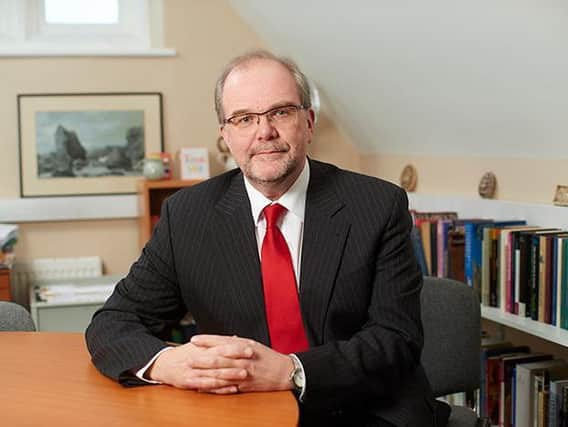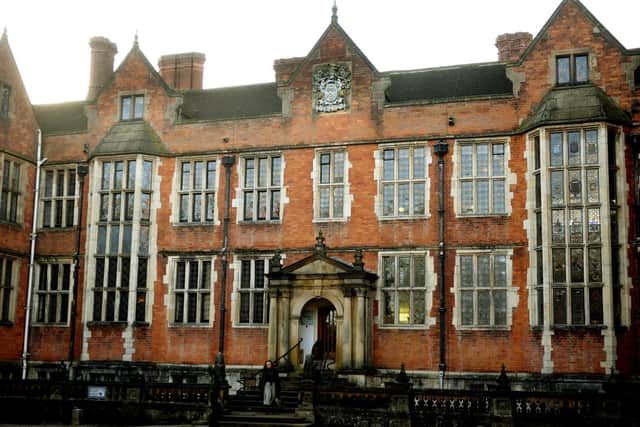Tributes paid to internationally renowned Yorkshire historian who died of cancer


Family, colleagues and students have paid their respects and celebrated the life of the groundbreaking University of York historian Professor Mark Ormrod, who died on the weekend after a four year battle with bowel cancer.
He was born in Neath, South Wales, made his mark at the University of Oxford, before having a distinguished career spanning more than 27 years at the University of York as a leading historian of the later Middle Ages in Britain.
Advertisement
Hide AdAdvertisement
Hide AdMark, who was born in 1957, is survived by his partner Richard, his two younger brothers Nicholas and Jonathan Ormrod and his loving parents Margaret and David Ormrod. He also leaves behind his two nieces.


Speaking to The Yorkshire Post about his eldest brother, Jonathan, said: “As a family he has left a wonderful legacy of love and care for us all.
“He was a wonderful elder brother and friend and support to his entire family and all the people he met.
“Mark was a very generous person with his time and his advice. He was a loving brother with a very good sense of humour.”
Advertisement
Hide AdAdvertisement
Hide AdIn 2016, he was diagnosed with bowel cancer, and despite his rapid decline in recent months Mark was described as “stoic” right up until the end.


“His decline at the end was shockingly sudden for us all,” explained Jonathan. “But he remained incredibly stoical and once again he was still expressing his concern for others, particularly his love and concern for his partner Richard.
“Richard has been incredible with Mark in looking after him throughout everything.”
Professor Ormrod joined the University of York in 1990 and held several leadership positions during his time including the director role of the Centre for Medieval Studies from 1998-2003.
Advertisement
Hide AdAdvertisement
Hide AdHe also struck up a very close working relationship with the Borthwick Institute for Archives, which he collaborated with on several groundbreaking projects. He was also a natural choice as the first Dean of the newly created Faculty of Arts and Humanities at York in 2009, a position that he held until his retirement in 2017.
Students and staff at the university have paid tribute to Mark’s “extraordinary” lasting legacy.
Professor Sarah Rees Jones, from the department of medieval history, who worked alongside Prof Ormrod for his duration at the University of York, told The Yorkshire Post: “He was an exceptionally powerful and influential scholar.
“His legacy is much more than York because he really has both transformed the understanding of later medieval England but also it has opened him up to the general public.”
Advertisement
Hide AdAdvertisement
Hide AdResearch remained Mark’s chief joy, he is the author or co-author of nine books, fourteen edited collections and well over eighty book chapters and articles.
These include the definitive 700-page biography of Edward III (Yale, 2011), an exceptionally complex project that had defeated several earlier scholars. His penultimate book (Women and Parliament in Later Medieval England) was published by Palgrave in July 2020 while his last book (Winner and Waster) was delivered to the publisher Boydell and Brewer just 10 days before he died.
Professor Rees Jones said: “A hallmark of his scholarship was the ability to combine accessible narrative with major new interpretations of important topics based on scrupulously thorough archival research; a combination of insight and detail that is rarely mastered.”
A further major collection of essays is forthcoming from the British Academy later this month.
Advertisement
Hide AdAdvertisement
Hide Ad“Despite his diagnosis he was incredibly resilient,” said Prof Rees Jones. “Of course you could see as the years went by - it affected him but he was utterly determined not to let it get the better of him.”
During his youth Mark was head boy at Neath Boys’ Grammar School. As a younger man he also led a very musical life, playing the clarinet and singing in choirs.
His younger brother Jonathan, 57, said: “Mark was always the absolute star at school… He came top of the class in everything he did.
“He was also an absolutely brilliant singer. And he sang in many choirs up until his late 20s to a very high standard.”
Advertisement
Hide AdAdvertisement
Hide AdAfter graduating from King’s College, University of London (with the highest first-class degree recorded at that time), he completed his doctorate in 1984 at the University of Oxford and then held a number of positions at the Universities of Sheffield, Evansville (British Campus), Queens University Belfast and Cambridge.
While at the University of York Mark’s innovative projects focused on creating public access online to the extensive but often obscure records of medieval government from The National Archives and the Borthwick Institute for Archives.
This included the award-winning England’s Immigrants 1350-1550, project which identified approximately 70,000 immigrants living in fifteenth-century England.
This resulted in the collaboration with the Historical Association and the Runnymede Trust, creating new teaching materials for schools, providing training for teachers and contributing to the content of a new national curriculum in History that focussed on the long history of migration to Britain.
Advertisement
Hide AdAdvertisement
Hide AdProf Rees Jones said: “It was groundbreaking. It changed the national curriculum and the teaching of history in schools - that was the area he would have worked on more if he had lived longer.
“He was determined to enable school children to study and understand the middle ages and study aspects of it like immigration that perhaps the general public would assume weren’t parts of medieval history. They might not have assumed that England was such an open country with so many people coming in and going out at that period.”
In addition to his own writing Mark also supervised twenty-eight PhD theses, and was the lead on nineteen major externally-funded research projects that were worth over £4m and provided early career positions to many former students.
In July 2020 a festschrift compiled by these former students and colleagues was presented to Mark as a tribute to that mentorship (Monarchy, State and Political Culture, ed. Craig Taylor and Gwilym Dodd).
Advertisement
Hide AdAdvertisement
Hide AdThese same scholars have endowed the ‘Mark Ormrod Prize’ in his honour. It is awarded annually to the best PHD on a medieval topic, in any discipline, completed at the University of York.
Other new initiatives that flourished in York because of Mark’s leadership and support include the White Rose College of the Arts and Humanities, the York Festival of Ideas, the Centre for Christianity and Culture and the York Medieval Press.
His brother Jonathan said: “Mark will have affected the lives of everyone who came into contact with him both professionally and personally.
“His legacy will live on through the books he has written, which will be used in schools and universities for time to come.
Advertisement
Hide AdAdvertisement
Hide Ad“And also through his colleagues who are now working in the academic sector - it’s like a baton being passed on from generation to generation.”
_____________________________
Editor’s note: first and foremost - and rarely have I written down these words with more sincerity - I hope this finds you well.
Almost certainly you are here because you value the quality and the integrity of the journalism produced by The Yorkshire Post’s journalists - almost all of which live alongside you in Yorkshire, spending the wages they earn with Yorkshire businesses - who last year took this title to the industry watchdog’s Most Trusted Newspaper in Britain accolade.
And that is why I must make an urgent request of you: as advertising revenue declines, your support becomes evermore crucial to the maintenance of the journalistic standards expected of The Yorkshire Post. If you can, safely, please buy a paper or take up a subscription. We want to continue to make you proud of Yorkshire’s National Newspaper but we are going to need your help.
Advertisement
Hide AdAdvertisement
Hide AdPostal subscription copies can be ordered by calling 0330 4030066 or by emailing [email protected]. Vouchers, to be exchanged at retail sales outlets - our newsagents need you, too - can be subscribed to by contacting subscriptions on 0330 1235950 or by visiting www.localsubsplus.co.uk where you should select The Yorkshire Post from the list of titles available.
If you want to help right now, download our tablet app from the App / Play Stores. Every contribution you make helps to provide this county with the best regional journalism in the country.
Sincerely. Thank you.
James Mitchinson
Comment Guidelines
National World encourages reader discussion on our stories. User feedback, insights and back-and-forth exchanges add a rich layer of context to reporting. Please review our Community Guidelines before commenting.